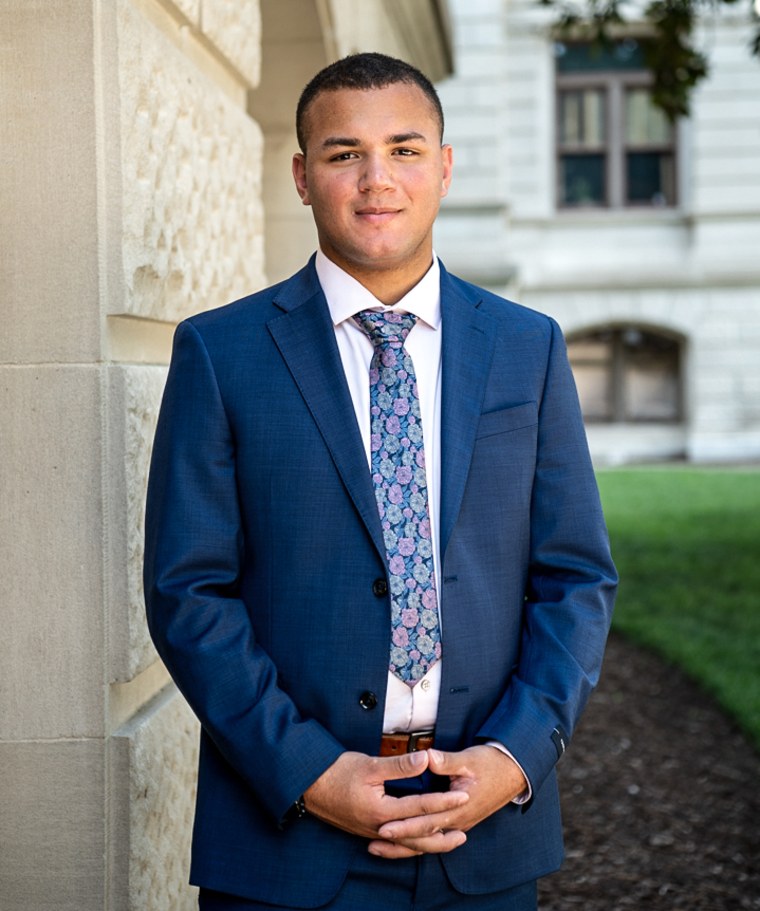After a successful effort earlier this year to ease longstanding restrictions on service members living with HIV, LGBTQ rights advocates are now pushing for more change. They want to end the U.S. military’s decades-old policy of barring people with HIV from enlisting.
LGBTQ advocacy group Lambda Legal filed a federal lawsuit Thursday on behalf of three individuals living with HIV: Isaiah Wilkins, a gay police officer in Georgia; a transgender lesbian woman who left the military in 2013 to transition and a straight woman who had dreams of becoming a parachute rigger. (The women are identified in the lawsuit with pseudonyms because they fear further discrimination, according to Lambda Legal.) Minority Veterans of America, a minority-serving organization for current and former service members, is also named as a plaintiff in the suit, which lists Defense Secretary Lloyd Austin and Army Secretary Christine Wormuth as defendants.

The lawsuit describes the ban on HIV-positive recruits as “incompatible” with modern medical advancements. The policy, the suit notes, has been in place since 1991 — years before the development of groundbreaking medical innovations that eventually transformed HIV from a death sentence into a mostly nontransmittable, manageable condition, with early detection and the right treatment.
Because of medical breakthroughs over the past decades, a 25-year-old living with HIV who is diagnosed early and receives appropriate treatment has approximately the same life expectancy as a 25-year-old living without HIV, the lawsuit says. A study published in 2014 in the Journal of the International AIDS Society found HIV patients who are successfully treated with antiretroviral therapy have normal life expectancies.
Thursday’s lawsuit, filed in U.S. District Court for the Eastern District of Virginia, follows Lambda Legal’s landmark victory in April, decided by the same court, that requires the Pentagon to now allow HIV-positive service members to be promoted and to deploy overseas.
Before the court ruling, U.S. military policy was to place restrictions on service members if they were diagnosed with HIV after they had successfully enlisted. In a memo to military leadership in early June, Austin eased the restrictions on those currently serving, but he didn’t address the policy that banned HIV-positive recruits.
Kara Ingelhart, a senior attorney at Lambda Legal representing the plaintiffs, called the April ruling “incredibly clear.”
“There should be no barrier for folks like Isaiah who want to serve,” she said, referring to the Georgia police officer.
Discriminating against people based on their HIV status has been illegal in the U.S. for every employer other than the U.S. military since the passage of the Americans with Disabilities Act of 1990.
“I think that there’s still just a ton of stigma around HIV,” Ingelhart said. “The military could really set an example for equity and inclusion.”
Wilkins, 23, served in the Georgia National Guard for more than two years. He tested positive for HIV while trying to join the Army Reserves as part of the application process for the United States Military Academy at West Point and was discharged from the Army Reserves in 2019. He called the discharge traumatic, and he said his long-held goal of becoming an Army pilot was “cut off” solely because of his HIV status.
The policy “really does discriminate against people who not only have the ability but the desire to serve,” he said.
NBC News reported in June that every branch of the U.S. military has experienced major challenges in meeting its recruitment quotas this year, as a record low number of Americans are eligible to serve because of increasing health- and crime-related disqualifications — and an even smaller number of them want to.
A Defense Department spokesperson declined to comment on the ongoing litigation. The United States Army did not immediately respond to a request for comment.
